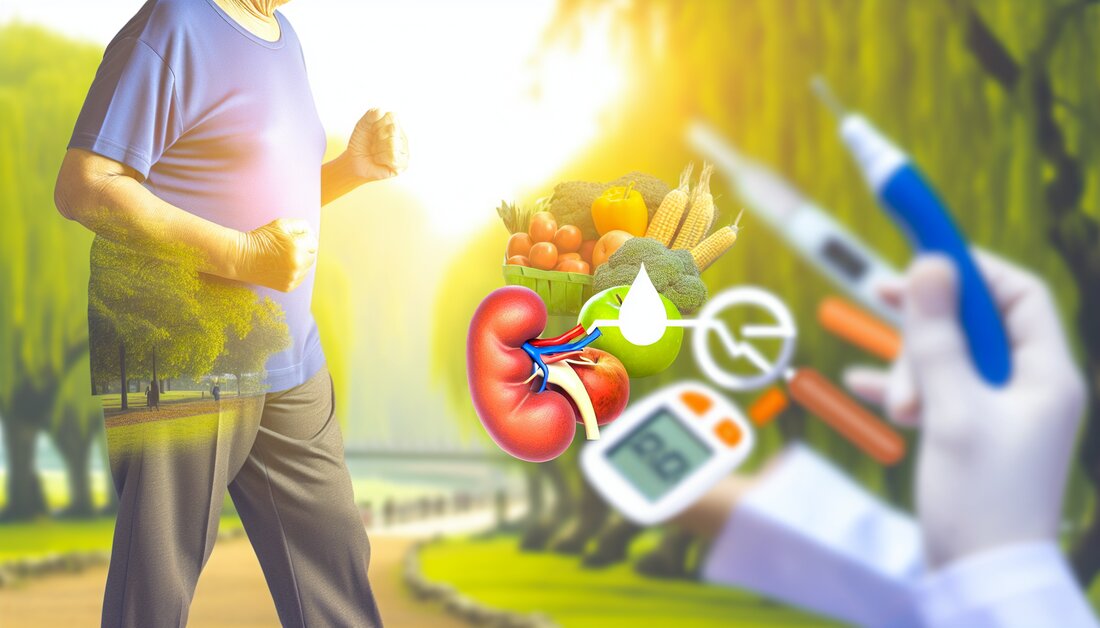Radical nephrectomy: Type 2 diabetes remission through lifestyle modification in geriatric patients
A 64-year-old patient achieved diabetes remission after nephrectomy and 1 year of lifestyle intervention. He lost 36 kg, normalized the HbA1c value and no longer needs medication.

Radical nephrectomy: Type 2 diabetes remission through lifestyle modification in geriatric patients
The research looks at the relationship between diabetes mellitus and renal cell carcinoma, a type of kidney cancer. It explores how a well-planned lifestyle can help treat patients with both conditions. In this case study, a 64-year-old man with type 2 diabetes who underwent a radical nephrectomy (surgical removal of a kidney) underwent an intensive year-long lifestyle intervention.
This intervention included a vegan diet, regular fasting, exercise, psychological support and medical care. After a year of this intervention, there were significant improvements in the patient's health: his diabetes went into remission, he lost significant weight, and his blood counts improved so that he no longer needed medication for cholesterol or diabetes.
These results suggest that lifestyle changes may play a promising role in treating complex health conditions, particularly in patients with a history of kidney disease and diabetes.
Future developments and impacts on previous practices:
These findings could change future medical practices by encouraging doctors to recommend more comprehensive lifestyle changes as part of the treatment of diabetes and cancer. Personalized lifestyle interventions may be superior to standard treatment approaches, particularly because they not only address the symptoms of disease but also address their underlying causes.
Basics and terms:
- Diabetes mellitus: Eine chronische Erkrankung, die den Zuckerstoffwechsel des Körpers beeinträchtigt, was zu hohen Blutzuckerwerten führt.
- Nierenzellkarzinom: Eine Art von Nierenkrebs, die von den Zellen beginnt, die die kleinen Kanäle in den Nieren auskleiden.
- Nephrektomie: Chirurgische Entfernung einer oder beider Nieren.
- Typ-2-Diabetes (T2D): Die häufigste Form von Diabetes, bei der der Körper Insulin nicht richtig verwendet.
- Lifestyle Intervention (ILI): Änderungen im täglichen Lebensstil, die Gesundheit und Wohlbefinden verbessern.
- Glykosiertes Hämoglobin (HbA1c): Ein Bluttest, der den durchschnittlichen Blutzucker der letzten zwei bis drei Monate misst.
- Intermittierendes Fasten: Eine Essensstrategie, bei der Essenszeiten mit Fastenzeiten abgewechselt werden.
- Veganer Ernährung: Eine Ernährung, die auf pflanzlichen Lebensmitteln basiert und alle tierischen Produkte ausschließt.
| Code number | Previously | Afterward | Reference range |
|---|---|---|---|
| HbA1c | >6.5% | <6.5% | <6.5% |
| cholesterol | 175 mg/dL | 127 mg/dL | <200 mg/dL |
| Triglycerides | 155 mg/dL | 73 mg/dL | <150 mg/dL |
Abbreviations:
- T2D: Typ-2-Diabetes
- ILI: Intensive Lebensstilintervention
- HbA1c: Glykosyliertes Hämoglobin
Impact of lifestyle interventions on diabetes mellitus in patients with renal cell carcinoma
This study examines the significant impact of diabetes mellitus on the survival of patients with renal cell carcinoma undergoing nephrectomy and highlights the need for personalized care. The focus is on a case study approach describing an intensive lifestyle intervention (ILI) in a patient with type 2 diabetes (T2D).
Methodology and intervention
The case described involved a 64-year-old man with T2D who underwent radical nephrectomy. The patient agreed to a 1-year ILI which included the following components:
- Vegane Ernährung zur Reduktion der Kalorienaufnahme und Förderung der Nierengesundheit
- Intermittierendes Fasten
- Regelmäßige körperliche Aktivität
- Psychologische Unterstützung
- Medizinische Überwachung und Management
Patient monitoring included quarterly biochemical assessments and monthly adherence assessments.
Results
After the intervention, the patient showed remission of diabetes, with an HbA1c value below 6.5% (48 mmol/mol) without medical support. Other important improvements included:
- Gewichtsverlust von 36 kg, wodurch sich der Body Mass Index (BMI) von 35,3 auf 25,1 verringerte
- Normalisierung des Lipidprofils
- Verbesserte Serumkreatinin- und hochsensitive C-reaktive Proteinspiegel
- Normale Glukosetoleranz über einen Zeitraum von 2 Jahren ohne erneutes Auftreten von Symptomen.
Biochemical parameters
| parameter | Before the ILI | After the ILI | Reference range |
|---|---|---|---|
| HbA1c (%/mmol/mol) | >6.5%/>48 mmol/mol | <6.5%/<48 mmol/mol | <6.5%/<48 mmol/mol |
| Total cholesterol (mg/dL/mmol/L) | 175/4.53 | 127/3.29 | <200 mg/dL/<5.18 mmol/L |
| Triglycerides (mg/dL/mmol/L) | 155/1.75 | 73/0.82 | <150 mg/dL/<1.69 mmol/L |
The case described in this study highlights the potential of lifestyle modifications in the treatment of T2D in patients with a history of nephrectomy. The study particularly highlights the importance of a well-structured, personalized lifestyle intervention to improve metabolic health and promote happiness in the long term.
For further information and to view the original study, visit the external link: https://pubmed.ncbi.nlm.nih.gov/39544889.

 Suche
Suche
 Mein Konto
Mein Konto
